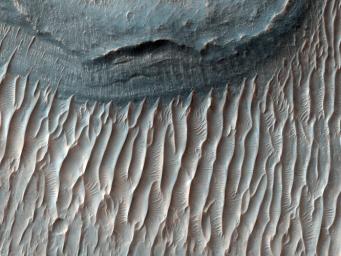
|
Ius Chasma’s Floor
- Click the image above for a larger view
- Full-Res JPEG (2560 x 1920) (811.1 kB)
- Full-Res TIFF (2560 x 1920) (14.8 MB)
Caption:
This image spans the floor of Ius Chasma's southern trench. Ius Chasma is located in the western region of Valles Marineris, the solar system's largest canyon. This canyon is well known for its fine stratigraphic layers modified by wind and water.
The outcrops contain interchanging layers of dark and bright rocks. The layered deposits consist of dark basalt lava flows and bright sedimentary layers. The sediments are likely to be from atmospheric dust, sand, or alluvium from an ancient water source. The layers are visible on the gentle slopes above the canyon floor, in pitted areas, and in small mesa buttes. The floor of the canyon is littered with megaripples that are aligned in a north-south direction.
Ius Chasma is believed to have been shaped by a process called sapping when water seeped from the layers of the cliffs and evaporated before it reached the canyon floor. This process is thought to have dominated during the Amazonian period.
Ius Chasma also has several structural features such as east trending normal faults and grabens that deformed the canyons. Recent geomorphological events include mass wasting (avalanches) and minor sapping from gullies that continued to erode the canyon walls.
See the full University of Arizona press release .
Background Info:
NASA's Jet Propulsion Laboratory, a division of the California Institute of Technology in Pasadena, manages the Mars Reconnaissance Orbiter for NASA's Science Mission Directorate, Washington. Lockheed Martin Space Systems, Denver, is the prime contractor for the project and built the spacecraft. The High Resolution Imaging Science Experiment is operated by the University of Arizona, Tucson, and the instrument was built by Ball Aerospace and Technology Corp., Boulder, Colo.
Cataloging Keywords:
| Name | Value | Additional Values |
|---|---|---|
| Target | Mars | |
| System | ||
| Target Type | Planet | |
| Mission | Mars Reconnaissance Orbiter (MRO) | Mariner |
| Instrument Host | Mars Reconnaissance Orbiter | |
| Host Type | Orbiter | Flyby Spacecraft |
| Instrument | High Resolution Imaging Science Experiment (HiRISE) | |
| Detector | ||
| Extra Keywords | Atmosphere, Color, Dust, Water | |
| Acquisition Date | ||
| Release Date | 2008-09-18 | |
| Date in Caption | ||
| Image Credit | NASA/JPL-Caltech/Univ. of Arizona | |
| Source | photojournal.jpl.nasa.gov/catalog/PIA11174 | |
| Identifier | PIA11174 | |
